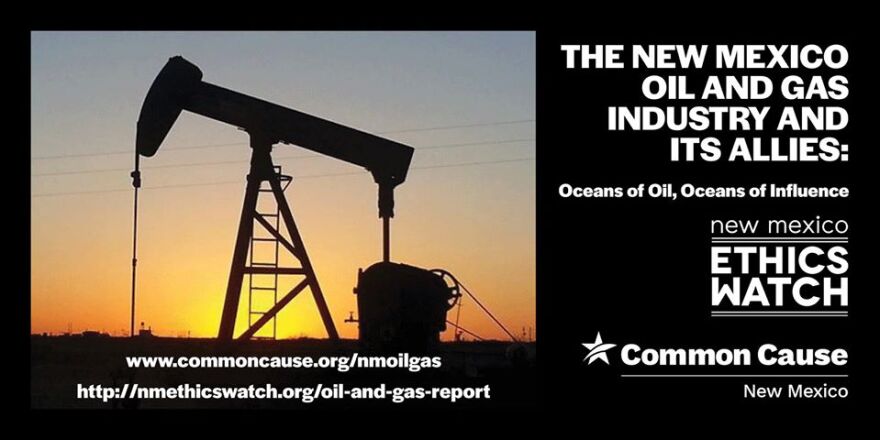Commentary: Common Cause New Mexico (CCNM) and New Mexico Ethics Watch (NMEW) released a new report examining the oil and gas industry’s influence on New Mexico politics, government and legislation.
The report’s release comes as the prices for oil take a nosedive, threatening New Mexico’s 2021 budget, which was built largely on projected revenue from the industry’s rapid growth in 2019.
Using data from the New Mexico Secretary of State’s Campaign Finance Information System (CFIS), the National Institute on Money in Politics’ website (FollowTheMoney.org), New Mexico In Depth’s Openness Project, and the Center for Responsive Politics’ OpenSecrets.org, the report documents the record amounts of money spent by the oil and gas industry, utilities, affiliated political action committees (PACs), and an army of lobbyists to wine-and-dine legislators, influence votes and elect friendly candidates. The full report can be found here, with summary of key findings here.
Facing the potential departure of a friendly administration in 2018, the oil and gas industry ramped up its efforts to become one of the leading direct contributors to both state and federal candidates and PACs in New Mexico, with more than $11.5 million spent on contributions and lobbying activities from 2017 to 2020 – a majority of which came from out of state. During the 2018 election cycle, oil and gas industry contributions surpassed other top donors, including lawyers, the real estate industry, the tobacco industry, the pharmaceutical industry, as well as teachers and health professionals.
Contributions tied to the oil and gas industry came from approximately 500 entities, ranging from corporations, individuals, associations, PACs and almost 100 registered lobbyists – which amounts to almost one lobbyist per legislator (112). Chevron USA had the highest contributions and expenditures made by lobbyists on behalf of oil and gas companies and utilities, with $3.2 million in contributions and expenditures made by just three lobbyists in 2017 to 2020 – or roughly $1 million a year. This includes almost $10,000 spent on meals for legislators from 2016 to 2018 by Alexis Street, a lobbyist for Chevron. In 2018, Chevron had a net income of $14.8 billion.
Individuals continue to contribute in large numbers, with the biggest single individual contributor from the oil and gas industry in New Mexico donating an average of $52,000 in campaign contributions per year – or double the entire per capita income of the average New Mexican ($26,085 in 2018).
“The recent oil boom in New Mexico has unleashed more than an ocean of oil and gas money, it has unleashed a gusher of campaign contributions, a flurry of lobbyists offering expensive dinners, and a mammoth public relations offensive financed by one of the largest and most powerful professional associations in the state,” said Heather Ferguson, executive director of Common Cause New Mexico. “With this report, we aim to shed light on the question: is this industry operating at an unfair advantage, buying its way out of regulation and getting benefits that others with smaller pocketbooks and everyday New Mexicans would never get?”
“Accountability for this industry – and other special interests – is our best hope for finding answers to these questions,” said former State Senator Dede Feldman, who co-authored the report with NMEW’s Lauren Hutchison, Tony Ortiz and Kathleen Sabo. “We hope this report allows members of the media, academia and general public to better scrutinize the political activities of this industry—in good times and bad--while encouraging legislators and government officials to take specific actions to improve transparency and accountability.”
Like other “Connect the Dots” reports compiled by Common Cause and similar lobbying reports by New Mexico Ethics Watch, this report tracks the relationship between industry donations to policymakers and the outcome of specific legislation in the 2019 session, such as a proposed bill to increase royalty rates on oil leased and produced on state lands. The report also includes a list of the top legislative recipients of oil and gas contributions and a ranking of all statewide candidate recipients from both parties from 2018-2020.
“As with past reports we’ve done, we want to point out that the correlations found here between campaign contributions and voting behavior do not imply that legislators are trading votes for campaign contributions or fancy dinners,” said NMEW Executive Director Kathleen Sabo. “Individual motivations for voting one way or another are impossible to determine with any certainty. That said, the correlation between contributions and voting behavior alone can erode trust in government at a time when the New Mexico public already believes that powerful interest groups and lobbyists have more influence on elected officials than the voters.”
As the role of dark money increases in New Mexico politics, the report also takes a look at the outsized role of industry associations, advocacy groups, Super PACs and out-of-state money pouring in to sway statewide offices like the State Land Commissioner.
The report concludes with specific recommendations in three categories to curb the influence of all special interests: diminishing the power of insiders by requiring lobbying moratoriums, increasing transparency by requiring more specific disclosure of lobbyist activities, and increasing enforcement mechanisms to prevent illegal coordination between state candidates and Super PACs.
The full report and additional resources can be found on the Common Cause New Mexico website at http://www.commoncause.org/


